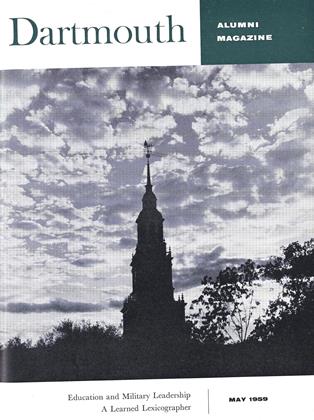By John G. Kemeny. Princeton: Van Nostrand, 1959. 273 pp. $4.9.
Now that science is exciting some extravagant adulation in adult bobby-soxers, and equal and opposite revulsion in the intelligentsia, it is not only academically interesting but also practically important to try to understand what the point of it is, what are its uses and limitations. Even though most people's reactions to contemporary science lie more soberly between these extremes, we might still have difficulty in stating precisely the fundamental distinctions say between physics, automotive engineering, and hydrogen-bomb warfare.
Regardless of what one thinks of the relative horror of our civilization's products, to know how to manage them, it is essential to understand their relation to science. Formerly it did not make so much difference that such distinctions were not clearly perceived, since the longer time-lag between the discovery of scientific knowledge and everyday life applications dissociated their roles. In any case, science was more often confused with mathematics or philosophy. This didn't get it into very much trouble, since interest in those fields was also rather unimpassioned.
We are indeed fortunate that in the last century, and especially in the last thirty years, philosophy has anticipated this crisis of understanding. It has at last made real progress toward the clarification of some self-conscious questions about science. This introspective study of science has yielded results which are as profound and exciting as the recent results belonging to science. One feels that this technical analysis bears the same relation to previous philosophical speculation that the vigorous experimentation of the renaissance scientists bore to the casual observation of the Greeks.
Although there have been authoritative popular presentations of recent advances in science - relativity, quantum theory, molecular genetics, neurophysiology, etc. — no one until Professor Kemeny had done the same for the new understanding of science itself. He has succeeded in outlining the main results and technical problems in nontechnical language.
He first explains science's relation to mathematics and enumerates its presuppositions. The question whether a law of nature exists is answered (affirmatively). Next the methods of science itself are described. Finally he discusses some general problems which have puzzled man for a long time — determinism, the nature of life, science and values. It is an agreeable tour of some fascinating country, and he does not force us to get out of the bus. (For those who think it would be fun to get out of the bus, he has provided well-chosen suggested reading lists.)
 View Full Issue
View Full Issue
More From This Issue
-
 Feature
FeatureGove (gōv), Philip (fĩl'ìp) B.
May 1959 By JAMES B. FISHER '54 -
 Feature
FeatureDartmouth Study Urges ROTC Program Changes to Meet Nation's Needs
May 1959 By JOHN HURD '21 -
 Feature
FeatureFourteen Gained — Three to Go
May 1959 -
 Feature
FeatureWar Memorial Planned in Center
May 1959 -
 Article
ArticleTHE FACULTY
May 1959 By HAROLD L. BOND '42 -
 Class Notes
Class Notes1915
May 1959 By PHILIP K. MURDOCK, JAMES LeR. LAFFERTY
Books
-
 Books
Books"Trends in Greek Organization,"
MAY 1930 -
 Books
Books"Psychology and the Days Work"
February 1919 By CHARLES FREDERICK ECHTERBECKER -
 Books
BooksBEHOLD OUR GREEN MANSIONS
January 1946 By F. S. Page '13 -
 Books
BooksVIETNAMESE ANTICOLONIALISM 1885-1925.
JANUARY 1973 By JOHN S. MAJOR -
 Books
BooksNO BUGLES FOR SPIES.
JULY 1963 By MICHAEL CHOUKAS '27 -
 Books
BooksTHE INTERACTION OF LAW AND RELIGION.
February 1975 By MURRAY SYLVESTER

